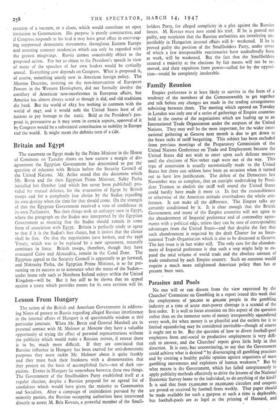Lesson From Hungary
The action of the British and American Governments in address- ing Notes of protest to Russia regarding alleged Russian interference in the internal affairs of Hungary is of questionable wisdom at thii particular juncture. When Mr. Bevin and General Marshall are in personal contact with M. Molotov at Moscow they have a valuable opportunity of trying the effect of personal representations without the publicity which would make a Russian retreat, if retreat there is to be, much more difficult. If they are convinced that Russian influence in Hungary has been exerted for anti-democratic purposes they must tackle Mr. Molotov about it quite frankly and they must back their frankness with a demonstration that they protest on the basis of accomplished facts—not of dark sus- picions. Events in Hungary lie somewhere between these two things. The Government of the Smallholders Party established itself at .a regular election, despite a Russian proposal for an agreed list of candidates which would have given the majority to Communists and Socialists. After a campaign of intimidation pursued by the minority parties, the Russian occupying authorities have intervened directly to arrest M. Bela Kovacs, a powerful member of the Small-
holders Party, for alleged complicity in a plot against the Russian forces. M. Kovacs must now stand his trial. If he is proved not guilty, any suspicion that the Russian authorities are interfering un- justifiably in Hungarian internal affairs will b- weakened. If he is proved guilty the position of the Smallholders Party, under cover of which a few irresponsible reactionaries have undoubtedly been at work, will be weakened. But the fact that the Smallholders secured a majority at the elections by fair means will not be re- moved, and their expulsion from power—called for by the opposi- tion—would be completely intolerable.


































 Previous page
Previous page